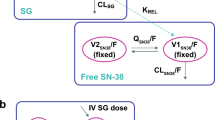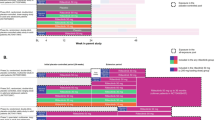Summary
This study evaluated the safety and efficacy of CT-2103, a novel conjugate of paclitaxel and poly-l-glutamate, in patients with HER2-negative, metastatic breast cancer who had received 0 or 1 prior lines of chemotherapy. Although CT-2103 had activity in this small study, neurotoxicity and hypersensitivity reactions were more frequent in this patient population than expected, and led to early termination of the trial. Purpose To evaluate the safety and efficacy of CT-2103, a novel conjugate of paclitaxel and poly-l-glutamate, in patients with metastatic breast cancer who had received 0 or 1 prior lines of chemotherapy. Patients and Methods Eighteen women with HER2-negative breast cancer were enrolled. Patients received intravenous CT-2103 at a dose of 175 mg/m2 of conjugated paclitaxel over 10 min every 3 weeks, without routine premedication. Eighty-three percent of women had received prior chemotherapy as part of adjuvant (39%), metastatic (17%), or both adjuvant and metastatic (28%) treatment. Three patients (17%) had previously received a taxane in the adjuvant setting. Results Objective responses were observed in 4 of 18 patients (overall response rate, 22%, 95% confidence interval, 6 to 48%). Grade 3 or 4 neuropathy was observed in four patients. Grade 3 or 4 hypersensitivity reactions (HSR) were observed in four patients; none occurred prior to cycle 4 of therapy. Because of the higher-than-expected rate of HSR, the study was terminated early. Conclusion Although CT-2103 had activity in this small study of women with HER2-negative metastatic breast cancer, neurotoxicity and hypersensitivity reactions were more frequent in this patient population than expected. Hypersensitivity reactions were most likely to occur in later cycles of treatment, suggesting a true drug allergy, distinct from the HSR typically seen with standard paclitaxel.
Similar content being viewed by others
References
Paridaens R, Biganzoli L, Bruning P, Klijn JG, Gamucci T, Houston S, Coleman R, Schachter J, Van Vreckem A, Sylvester R, Awada A, Wildiers J, Piccart M (2000) Paclitaxel versus doxorubicin as first-line single-agent chemotherapy for metastatic breast cancer: a European Organization for Research and Treatment of Cancer Randomized Study with cross-over. J Clin Oncol 18(4):724–733
Seidman AD, Tiersten A, Hudis C, Gollub M, Barrett S, Yao TJ, Lepore J, Gilewski T, Currie V, Crown J et al (1995) Phase II trial of paclitaxel by 3-hour infusion as initial and salvage chemotherapy for metastatic breast cancer. J Clin Oncol 13(10):2575–2581
Nabholtz JM, Gelmon K, Bontenbal M, Spielmann M, Catimel G, Conte P, Klaassen U, Namer M, Bonneterre J, Fumoleau P, Winograd B (1996) Multicenter, randomized comparative study of two doses of paclitaxel in patients with metastatic breast cancer. J Clin Oncol 14(6):1858–1867
Chevallier B, Fumoleau P, Kerbrat P, Dieras V, Roche H, Krakowski I, Azli N, Bayssas M, Lentz MA, Van Glabbeke M (1995) Docetaxel is a major cytotoxic drug for the treatment of advanced breast cancer: a phase II trial of the clinical screening cooperative group of the European organization for research and treatment of cancer. J Clin Oncol 13(2):314–322
Burstein HJ, Manola J, Younger J, Parker LM, Bunnell CA, Scheib R, Matulonis UA, Garber JE, Clarke KD, Shulman LN, Winer EP (2000) Docetaxel administered on a weekly basis for metastatic breast cancer. J Clin Oncol 18(6):1212–1219
Chan S, Friedrichs K, Noel D, Pinter T, Van Belle S, Vorobiof D, Duarte R, Gil Gil M, Bodrogi I, Murray E, Yelle L, von Minckwitz G, Korec S, Simmonds P, Buzzi F, Gonzalez Mancha R, Richardson G, Walpole E, Ronzoni M, Murawsky M, Alakl M, Riva A, Crown J (1999) Prospective randomized trial of docetaxel versus doxorubicin in patients with metastatic breast cancer. J Clin Oncol 17(8):2341–2354
Ibrahim NK, Samuels B, Page R, Doval D, Patel KM, Rao SC, Nair MK, Bhar P, Desai N, Hortobagyi GN (2005) Multicenter phase II trial of ABI-007, an albumin-bound paclitaxel, in women with metastatic breast cancer. J Clin Oncol 23(25):6019–6026
Winer EP, Berry DA, Woolf S, Duggan D, Kornblith A, Harris LN, Michaelson RA, Kirshner JA, Fleming GF, Perry MC, Graham ML, Sharp SA, Keresztes R, Henderson IC, Hudis C, Muss H, Norton L (2004) Failure of higher-dose paclitaxel to improve outcome in patients with metastatic breast cancer: cancer and leukemia group B trial 9342. J Clin Oncol 22(11):2061–2068
O’Shaughnessy J, Tjulandin S, Davidson N, Shaw H, Desai N, Hawkins M, Gradishar WJ (2003) ABI-007 (Abraxane), a nanoparticle albumin-bound (NAB) paclitaxel demonstrates superior efficacy vs. Taxol in MBC: a phase III trial. In: San Antonio breast cancer symposium
Seidman AD, Berry D, Cirrincione C, Harris L, Dressler L, Muss H, Naughton M, Norton L, Winer E, Hudis C (2004) CALGB 9840: phase III study of weekly (W) paclitaxel (P) via 1-hour (h) infusion versus standard (S) 3 h infusion every third week in the treatment of metastatic breast cancer (MBC), with trastuzumab (T) for HER2 positive MBC and randomized for T in HER2 normal MBC. J Clin Oncol 22(14S): abstract 512
Sledge GW, Neuberg D, Bernardo P, Ingle JN, Martino S, Rowinsky EK, Wood WC (2003) Phase III trial of doxorubicin, paclitaxel, and the combination of doxorubicin and paclitaxel as front-line chemotherapy for metastatic breast cancer: an intergroup trial (E1193). J Clin Oncol 21(4):588–592
Jones SE, Erban J, Overmoyer B, Budd GT, Hutchins L, Lower E, Laufman L, Sundaram S, Urba WJ, Pritchard KI, Mennel R, Richards D, Olsen S, Meyers ML, Ravdin PM (2005) Randomized phase III study of docetaxel compared with paclitaxel in metastatic breast cancer. J Clin Oncol 23(24):5542–5551
Wiernik PH, Schwartz EL, Strauman JJ, Dutcher JP, Lipton RB, Paietta E (1987) Phase I clinical and pharmacokinetic study of taxol. Cancer Res 47(9):2486–2493
Kris MG, O’Connell JP, Gralla RJ, Wertheim MS, Parente RM, Schiff PB, Young CW (1986) Phase I trial of taxol given as a 3-hour infusion every 21 days. Cancer Treat Rep 70(5):605–607
Grem JL, Tutsch KD, Simon KJ, Alberti DB, Willson JK, Tormey DC, Swaminathan S, Trump DL (1987) Phase I study of taxol administered as a short i.v. infusion daily for 5 days. Cancer Treat Rep 71(12):1179–1184
Robson L, Verrill M, Lind M, Simmons P, Perren T, Coombes C, Earl H, Calvert H, Campbell M, Bolton M (2003) A phase 2 study of CT-2103, a poly(L-glutamic acid)-paclitaxel conjugate administered every 3 weeks in patients with advanced breast cancer. Proc Am Soc Clin Oncol 22:42
Miller KD, Wang M, Gralow J, Dickler M, Cobleigh MA, Perez EA, Shenkier TN, Davidson NE (2005) A randomized phase III trial of paclitaxel versus paclitaxel plus bevacizumab as first-line therapy for locally recurrent or metastatic breast cancer. In: American Society of Clinical Oncology 41st annual meeting
Bonomi P, Paz-Ares L, Langer C (2005) Xyotax vs docetaxel for the second line treatment of non-small cell lung cancer (NSCLC): the STELLAR 2 phase III trial. Lung Cancer 29(Suppl 2):S35
Langer CJ, Socinski MA, Ross H, O’Byrne KJ (2005) Paclitaxel poliglumex (PPX)/carboplatin vs paclitaxel/carboplatin for PS2 patients with chemotherapy-naive advanced non-small cell lung cancer: a phase III study. J Clin Oncol 23(16S):623s
Sabbatini P, Aghajanian C, Dizon D, Anderson S, Dupont J, Brown JV, Peters WA, Jacobs A, Mehdi A, Rivkin S, Eisenfeld AJ, Spriggs D (2004) Phase II study of CT-2103 in patients with recurrent epithelial ovarian, fallopian tube, or primary peritoneal carcinoma. J Clin Oncol 22(22):4523–4531
Markman M, Kennedy A, Webster K, Elson P, Peterson G, Kulp B, Belinson J (1999) Clinical features of hypersensitivity reactions to carboplatin. J Clin Oncol 17(4):1141
Schiavetti A, Varrasso G, Maurizi P, Castello MA (1999) Hypersensitivity to carboplatin in children. Med Pediatr Oncol 32(3):183–185
Polyzos A, Tsavaris N, Kosmas C, Arnaouti T, Kalahanis N, Tsigris C, Giannopoulos A, Karatzas G, Giannikos L, Sfikakis PP (2001) Hypersensitivity reactions to carboplatin administration are common but not always severe: a 10-year experience. Oncology 61(2):129–133
Acknowledgement
Supported by Cell Therapeutics Inc., Seattle, WA.
Author information
Authors and Affiliations
Corresponding author
Rights and permissions
About this article
Cite this article
Lin, N.U., Parker, L.M., Come, S.E. et al. Phase II study of CT-2103 as first- or second-line chemotherapy in patients with metastatic breast cancer: unexpected incidence of hypersensitivity reactions. Invest New Drugs 25, 369–375 (2007). https://doi.org/10.1007/s10637-007-9034-y
Received:
Accepted:
Published:
Issue Date:
DOI: https://doi.org/10.1007/s10637-007-9034-y




